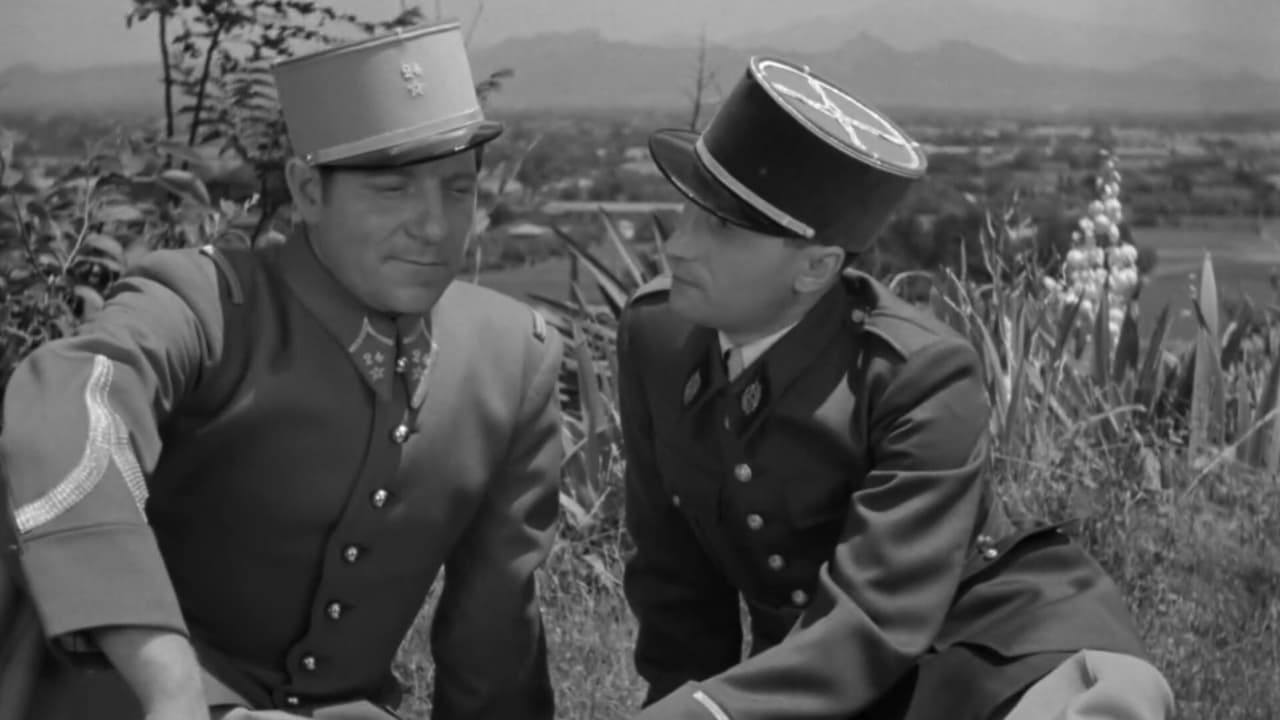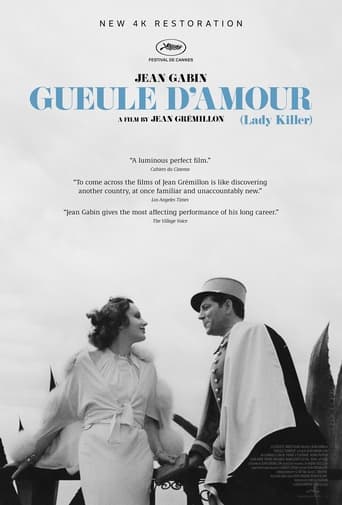ElMaruecan82
Through hazard, Gabin crossed the path of movies at their first sounding footsteps, and through talent, he stayed there and became the most defining and iconic male figure of French cinema.Is there a Gabin in Hollywood? Well, there's a little bit of Humphrey Bogart and Spencer Tracy in Gabin's rugged face, it's only fair that these three actors defined Michael Caine's personal vision of manhood. Gabin spotted icy blue eyes on which Prevert said they were incarnating quiet strength and lips thinned by the hits from life. Gabin was the man, as a romantic figure, a blue-collar loyal pal, an outcast or an outlaw with a sense of honor that transcended the barriers of law.But there was more in Gabin than a face, a street-wise charisma or an accent, there was talent, he often happened to be the best actor surrounded by cast members who started on the stage. Gabin was a natural, he never needed to over-play a feeling, his eyes and his voice carried half the performance, he could say a lot without saying much, which fit most of the characters he played by the second half of the thirties, a Golden Age of cinema incarnated by the poetic realism wave. There was a freedom of artistic expression that allowed the anti-heroic figure to emerge and even some pioneering noir stories to which Gabin was the flagpole."Lady Killer" is one of these films that, while not ringing a bell, will remind many movie lovers of classic noir movies involving abusive seductive women, most commonly known as 'femme fatale'. But the emphasis is less on the woman but on the impact she had on the titular protagonist, Lucien Bourrache aka 'Gueule d'Amour'. 'Lady Killer' is a fair translation but it gives a misleading idea that the bearer of that nickname is a self-aware womanizer, while the notion juxtaposes in French two opposite ideas: "gueule" refers to a mug, a face in vulgar slang while "amour" doesn't need any translation. It fits Gabin who exudes that mix of virility and gentleness, but expecting a 'lady killer' is not such a bad preconceived idea to have, because the film's delight is on its plot twist.Indeed, when Jules Grémillion opens "Lady Killer" with the people of Orange, a peaceful and boring small town of the South of France, welcoming the 'spahis', infantry soldiers of the North African armies, you expect Gabin to make quite a sensation among the members of the female persuasion. And why not? With his smiling face, his blondish rebel hair and his youthful smile, he can only make women's hearts melt. This is Gabin after "La Bandera", the film that launched his stardom, where he played a charismatic military figure with a way with women, so there's no reason to expect a different figure, but "La Bandera" was a man's movie, guys had priorities and women weren't part of them. Things are different here and even the man's man Gabin will behave like a little boy.Lucien Bourrache has all it takes to start a new life, a prestigious past, some money he just inherited, a good friend and his titular 'gueule', but he falls in love with the wrong person: Madeleine (Mireille Balin), she borrows his money and plays it on the casino, she loses, but he's too enamored to blame her. This is only the start of the romance and what I took as an act of gallantry from Gabin will slowly reveal itself to be weakness, and it takes some extraordinary strength to play an infatuated and needy character at the expenses of his own self-esteem, jeopardizing his professional life, his friendship for the sake of a love of blinding effect, but this is a credit to the immense talent of Gabin and his instinct. At this point of his career, he could choose his roles and didn't care for picking a guy who, by the very standards he created, would be a wimp.This is not the romance you expect, Lucien doesn't have the upper hand, he's the one who seems to beg for rendezvous and is constantly disappointed. I was surprised to recognize myself in situations like calling a girl after she canceled a date or having to deal with days of patience and bargains, it is so weird to see Gabin acting like but without spoiling the story, there was a reason he liked the role, and the way the ending closes the characters' act is the satisfying conclusion of a harrowing journey, one you wouldn't expect from such a benign title, the premises of the noir anti-romances and the movies where tough guys would play abused men like "Scarlett Street".Actress Mireille Balin played Gabin's love interest in "Pepe Le Moko" and in "Lady Killer", she pioneers the figures of femme fatale abusing men and exploiting their trust and romantic feelings for material purposes. The film offers many other archetypes such as a sneaky butler (Jean Ayme) and a mackerel of a mother (Jane Marken) of infuriating cynicism, there's such a contrast between the pervert mentalities of the bourgeois and the trust of the blue collar guy that you can see some political comments behind "Lady Killer", a sort of social movie showing how far you could go for money, as Madeleine seems obviously coming from a poor milieu."Lady Killer" is such a sad and sordid movie but one of Gabin's best and most defining roles. It starts in all sunshine and dashing smiles but takes you in the unforgettable descent into the darkest sides of human soul, many crimes are committed in the film but perhaps the worst of all is to have swept off the idealism and gentleness from the heart of our beloved "Gueule d'Amour".
evening1
Jean Gabin is strong in this tale of a handsome man who could have any woman he wants but chooses a psychopath.Like a moth drawn to a flame that he knows will destroy him, Barrouche pursues the kept woman played by Mireille Balin (whose allure I cannot understand -- neither in "Pepe le Moko" nor in this far less powerful work).I enjoyed the scenes in which Gabin gives a piece of his mind to Madeleine, her pimp-like mother, and her snooty servant. I liked less that his nickname translates as "lady killer"...you can see where this plot is heading from a mile away.The final frame of this film is quite poignant and surprising.I liked this movie best for the psychological complexity of Gabin, an intensely attractive man who looks a bit like Kenneth Branagh on a really good day. Non, they just don't make stars like him anymore...

